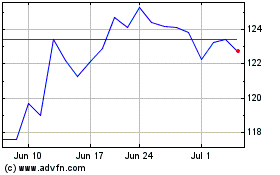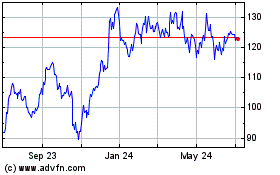Private-equity giant TPG has closed its first high-risk
real-estate fund, raising more than $2 billion in commitments at a
time when big investors' appetite for real-estate risk is
increasing.
TPG, a relatively new player in real-estate investment, began
fundraising for the dedicated real-estate fund it just closed in
the first half of 2014, with a goal of $1.5 billion to $2
billion.
Reaching that goal was challenging, even for a firm as big as
TPG, which has a total of $75 billion in assets under
management.
"This took roughly around the time we expected, maybe a bit
longer," said Kelvin Davis, the senior partner at TPG who is
co-head of its real-estate business. "We had to build some
relationships from scratch, and understandably that takes
time."
Investors fled from real-estate funds after many got clobbered
during the downturn, and have been returning to the business
slowly, with a strong preference for firms with long, successful
track records in real estate.
Without such a track record, the San Francisco-based firm has
had to prove itself. TPG's real-estate unit began investing in
2009, through one of the firm's broad buyout funds as well as
special accounts set up for individual investors.
Fundraising is getting easier because pension funds, insurance
companies, sovereign-wealth funds and other institutions
increasingly are seeking the kind of yield the riskiest real-estate
funds—known as "opportunity funds"—are offering. These investors
preferred trophy office buildings and other so-called core assets
in the early stages of the recovery. But the prices of these
properties have soared in the past three years, driving yields
down.
Strengthening economies in Europe and the U.S. and loosening
credit markets have increased the likelihood that risky strategies
pay off.
"There's increased confidence in real estate among institutional
investors," said Andrew Moylan, head of real estate for Preqin,
which tracks private-equity fundraising.
So far this year, real-estate opportunity funds have raised
$47.7 billion, a post-2008 record that already has outpaced 2014's
$34.5 billion, but still way lower than the $74.2 billion in 2008,
according to Preqin. Overall, private-equity real-estate funds,
including those focusing on less risky assets, have raised $87.2
billion this year, compared with $108 billion for all of 2014 and
$138.1 billion in 2008, Preqin said.
TPG is becoming a bigger player in real estate at a time when
the firm has been pondering a possible initial public offering,
following rivals like Blackstone Group LP and KKR & Co.,
according to people familiar with the matter. To appeal more to
stock investors, those firms diversified their earnings from the
boom-and-bust nature of corporate buyouts by building up businesses
that invested in debt, hedge funds and real estate.
Lately real estate has been a particular focus. Blackstone's
second-largest business is now its real-estate unit, which managed
$91.6 billion as of June 30. Another TPG rival, Apollo Global
Management LLC, in August agreed to buy most of property mogul
Nicholas Schorsch's real-estate empire in a deal that more than
doubled the size of its real-estate segment to about $27 billion
under management.
In an interview Monday, James Coulter, TPG's co-founder, said
the firm's push into the real-estate business isn't tied to a
possible IPO. Rather it is part of a strategy of "organically
growing" TPG's alternative investment platforms and taking
advantage of market opportunities.
While TPG is relatively new to raising real-estate opportunity
funds, Mr. Davis is a veteran in the business. He co-founded one of
the leading real-estate private-equity firms, Colony Capital, in
1991 and worked there until 2000, when he joined TPG. He then ran
the firm's North American corporate business until 2009.
Since 2009, TPG's real-estate unit has made about $2.7 billion
in real-estate investments through the firm's buyout fund and
special accounts set up for investors including the New Jersey
Division of Investment and Ivanhoe Cambridge, the property investor
for Canadian pension manager Caisse de Depot et Placement du
Quebec. TPG also has committed about $600 million of the
opportunity fund it just closed, which is focusing on deals in
Europe and North America.
Mr. Davis declined to specify the new fund's return objective.
Opportunity funds typically shoot for annual returns of more than
15%.
TPG has distinguished itself from other firms in part by
investing in real-estate companies rather than individual
properties. For example, in 2014 it invested in LifeStorage and has
helped build it into one of the country's top-10 self-storage
companies, with close to six million square feet of space.
"The industry is enormously fragmented" and is seeing
"relatively muted supply growth," said Mr. Davis. Large players
also have major competitive advantages because of their ability to
brand and market, he added.
TPG also owns P3 Logistic Parks, a pan-European industrial
platform. Partly based on that experience, the new fund is buying
Trigranit, a Hungary-based developer that owns property throughout
Central and Eastern Europe, particularly Poland.
TPG is bullish on Polish real estate because of its "emerging
middle class that becomes more consumptive as they gain wealth,"
Mr. Davis said.
Write to Peter Grant at peter.grant@wsj.com and Ryan Dezember at
ryan.dezember@wsj.com
Subscribe to WSJ: http://online.wsj.com?mod=djnwires
(END) Dow Jones Newswires
October 06, 2015 21:05 ET (01:05 GMT)
Copyright (c) 2015 Dow Jones & Company, Inc.
Blackstone (NYSE:BX)
Historical Stock Chart
From Mar 2024 to Apr 2024

Blackstone (NYSE:BX)
Historical Stock Chart
From Apr 2023 to Apr 2024
